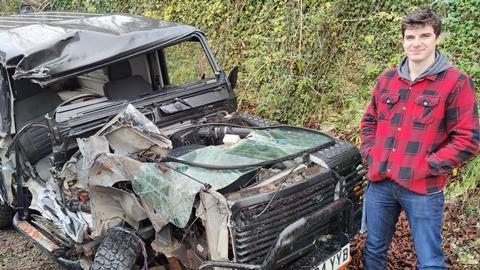A law graduate who feared his career was over after a horrific car crash has talked about his remarkable recovery as he starts a new legal role. Jack Ferns was placed into a medically-induced coma two years ago after suffering a brain injury the size of a golf ball following a head-on collision with a van.
Despite concerns about the effects of his injuries, Ferns made rapid progress and was released from hospital after 12 days. He then went through weeks and months of progress and setbacks before he got to a stage where he applied for a job with national firm Clarke Willmott. He was offered a position as a paralegal with its commercial and private client litigation team in Southampton and – six weeks into the new job – says he is loving being back in work and forging a legal career.
‘It was almost delivered as a certainty that I would not be the same person, or there was an incredibly likely chance I have a different personality or would not be able to pursue law, let alone study anything else and that absoloutely terrified me,’ said Ferns, now 22.
‘I made the decision to pursue law back in 2016/17. It had become quite well-known that I was pursuing law as a career, so much so I would get the usual remarks about ‘the lawyer’ getting the next round of drinks, or perhaps ‘the wannabe solicitor’ knows the law, so ask him etc - and when the accident happened, and I had come home from the hospital, all of that stopped immediately.’
Ferns, from Dorset, had completed a law degree the same year as his accident and enrolled on the Legal Practice Course and Master’s programme at Anglia Ruskin University. He was physically active and enjoyed a variety of sports including jujitsu, as well as training air cadets in his spare time.
As well as the brain injury, he suffered a broken collar bone, severe damage to both knees, a puncture to the right side of his abdomen and damage to his elbow and wrist.
Personal injury firm Stewarts was instructed within a few days of the accident, which allowed Ferns and his family to deal with non-compensation issues. Interim funds were secured through close working with the defendant insurers and various experts were instructed, including a consultant orthopaedic surgeon, consultant neurologist and consultant neuropsychologist.
A case manager was appointed from Integrated Case Management and Ferns sought advice from Poole’s Psychology ward, who advised him to read, practice his speech, exercise and learn new skills to keep occupied.
‘My capacity went from 100% of my usual workload, down to about 20%, at a push. And it destroyed me, I genuinely felt lost for a few weeks and did not know what I would do,’ he added.
‘I’d do almost everything in that [advised] list every day. I read law-based books, fiction novels, learned to cook new recipes, identified an exercise routine/pattern - and, whilst it sounds Hollywood, it felt like it escalated my recovery tenfold.’
‘I have said this a lot, but it never feels like enough - everyone who has helped, my family, friends, Stewarts, my case manager, the hospital, my colleagues (current and past) - everyone - has helped so much and I feel so well supported and there is absolutely no way I would have ended up where I am without that support.’
Nichola Fosler, the partner at Stewarts who represented Ferns, said the priority had been to take the stress of any claim away from him and let him concentrate on rehabilitation and recovery.
‘The case demonstrates the importance of having collaborative relationships with defendant insurers to secure early interim funds to give clients like Jack access to focused rehabilitation,’ she added. ‘In this case it has meant that Jack has had the right support network around him for his rehabilitation, and has been able to move forward with his legal career.’




























6 Readers' comments